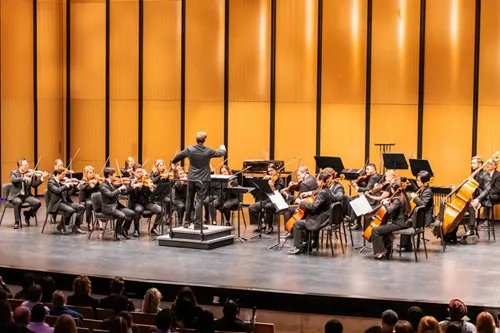
Since its establishment in 2011, the Dallas Chamber Symphony has made the inclusion of an instrument competition a significant aspect of its programming. After successfully organizing several piano competitions, the orchestra is now introducing the Dallas International Violin Competition, which will culminate in the final round on June 20 at Moody Performance Hall in the Dallas Arts District.
Richard McKay, the Music and Artistic Director of the Dallas Chamber Symphony, emphasized the importance of the competition in the orchestra's long-term plan of cultivating an audience and fostering a local community interested in witnessing national and international talent. The competition provides an opportunity to attract individuals who may not have otherwise considered visiting Dallas.
McKay expressed pride in the accomplishments of past piano competition winners, such as Kenny Broberg, who won the silver medal at the 2017 Cliburn Competition, and Jonathan Mamora, who made his debut at Carnegie Hall's Weill Recital Hall. He noted the positive impact of participating in the Dallas competition on the subsequent professional achievements of these musicians. Considering the strong solo traditions associated with certain instruments, particularly the violin and cello, the orchestra decided to leverage its experience in organizing piano competitions to develop a violin competition. McKay acknowledged the distinct cultural dynamics of the violin scene compared to the piano scene.
The 12 participants in the competition, ranging in age from 18 to 35, come from various countries, including Japan, Ukraine, and South Korea. Most of them are young musicians who have recently completed or are nearing the end of their graduate performance degrees. For some participants, this competition represents a breakthrough moment, especially those who have not yet had the opportunity to perform with an orchestra.
The competition commenced on June 14, with the quarterfinals and semifinals held at the Arlington ISD Center for the Performing Arts. In the quarterfinals, the violinists perform a concerto accompanied by a pianist playing the orchestral piano reduction.
Each participant receives a custom itinerary outlining their rehearsal spaces for the day. They have scheduled time to work with a provided staff accompanist or their own chosen accompanist, depending on their preference.
The semifinalists present a 20-minute unaccompanied solo recital program. From the semifinalists, three finalists—Chaewon Kim, Sarah Ma, and Jaewon Wee—have been selected. In the final round, accompanied by the Dallas Chamber Symphony under the guest conductor Jim Stopher, they will perform the concerto from the quarterfinals. Prior to the final round performance, the finalists will have three rehearsals with the orchestra, starting in the morning of June 19.
McKay expressed his enthusiasm about the competition providing the orchestra with additional opportunities to collaborate with guest conductors. It allows the orchestra to present a concert and expand its season by 20%. This growth is significant for the orchestra's development.
Apart from three jurors determining the first, second, and third prize winners, the audience will have the opportunity to select their favorite violinist for an audience choice award. The decisions regarding the awards are independent and not influenced by the orchestra's staff or musicians. In addition to a cash prize of $2,500, the first prize winner will have the privilege of performing with the Dallas Chamber Symphony during its 2023-2024 season.
McKay mentioned that the winning violinist will likely perform a different solo piece during the next season than the one presented in the finals. Since many of these violinists perform large concertos designed for a full orchestra, the competition serves as an occasion for the orchestra to showcase its full ensemble. For their subsequent performance, the selected violinist will likely perform a chamber orchestra piece more suited to the venue. This allows the exploration of a broader range of repertoire that is often overlooked.



